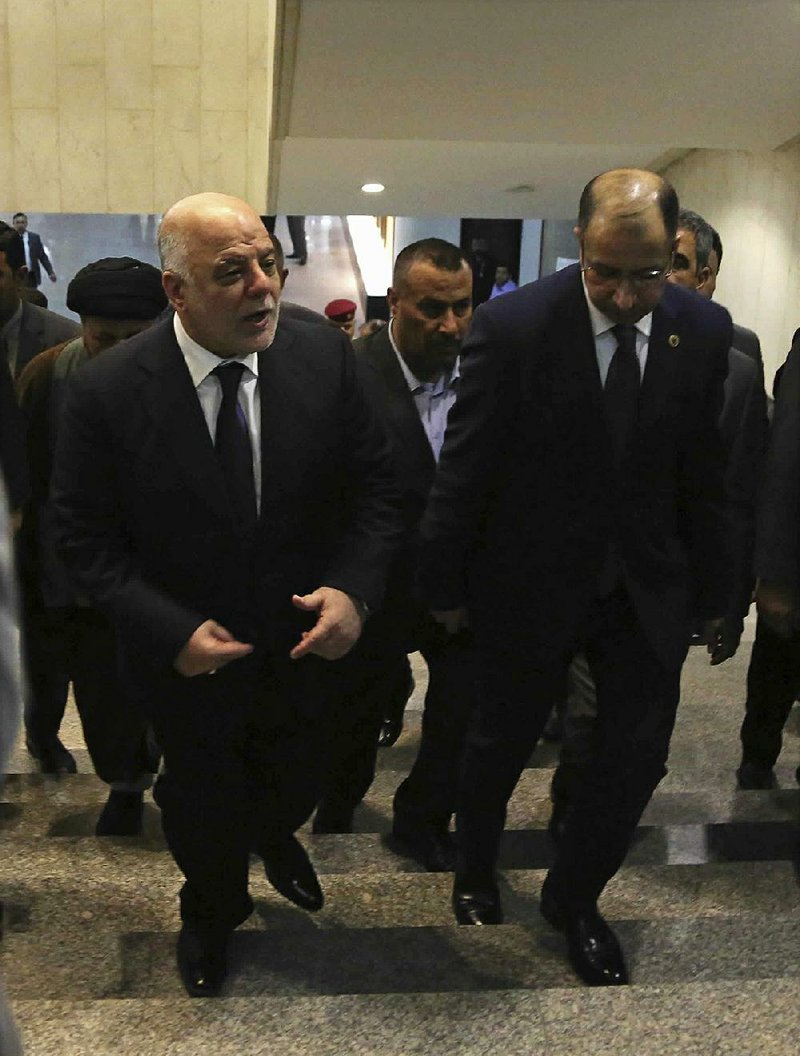IRBIL, Iraq -- Kurds in northern Iraq voted to secede from the country, according to results of a referendum announced Wednesday, despite threats of military intervention from the central government and a fierce backlash by its neighbors.
Kurds celebrated in the streets of Irbil, the capital of their semiautonomous enclave, hailing the result as a landmark moment in a century-long and bloody fight for independence. Nearly 93 percent of voters approved the referendum, which was held Monday.
The bid for autonomy has roiled Iraq's central government, Turkey and Iran. The United States, the Kurds' closest ally, also did not support the referendum, fearing instability and a disruption in the fight against the Islamic State.
U.S. officials have struggled to balance their support of the Kurdish region with its close ties to Baghdad and have tried to calm increasingly sharp rhetoric from both sides.
Kurdish election authorities said they were proud of the 72 percent turnout, calling it a powerful expression of the enthusiasm for self-rule.
Earlier Wednesday, Iraqi lawmakers authorized Prime Minister Haidar al-Abadi to deploy troops to a disputed city in northern Iraq and urged legal action against Kurdish leaders as a showdown escalated over the vote. The parliament also called for the government to take control of all oil fields in the Kurdish region, one of the few sources of revenue for the landlocked enclave.
Several regional airlines said they would suspend flights to airports in the Kurdish region in a sign of Baghdad's pressure to try to punish and isolate the Kurds.
Turkey and Iran are worried about their own restive Kurdish populations.
In Iran's Kurdish regions, security forces arrested scores of people after residents held pro-referendum demonstrations on the night of Monday's vote, according to activists and Kurdish political leaders. Countless more were summoned for interrogation, said Loghman Ahmedi, the head of foreign relations for the Kurdish Democratic Party of Iran.
Iran's Supreme National Security Council also briefed the parliament Wednesday on the government's strategy to "confront" Kurdish independence in Iraq, local media reported.
Several regional powers have threatened to impose a raft of sanctions to forestall any further steps toward independence and force the Kurds to negotiate with Baghdad. Iran and Turkey have separately held military exercises along their borders with the Kurdish region ahead of and since the vote.
Although it opposed the referendum, the U.S. State Department said Tuesday that it would not affect Washington's long-standing partnership with the regional government.
The flight suspensions -- by Egyptian, Lebanese and Turkish carriers, as well as one based in Dubai -- came after al-Abadi ordered Kurdish authorities to surrender control of the airports to the central government in Baghdad by Friday.
In a speech to parliament Wednesday, al-Abadi demanded the annulment of the independence vote, saying Iraq would "not allow any violation of the constitution."
"We will impose the rule of Iraq in all of the areas of the [Kurdistan Regional Government], with the strength of the constitution," he added. "There will be no fighting between the sons of one country, but we will impose the law, you will see."
The parliament authorized al-Abadi to send troops to Kirkuk, an oil-rich city that is claimed by Baghdad as well as the Kurdish region and has been a flash point in the contest for territory between the two governments. Lawmakers also called for the prosecution of Kurdish officials responsible for organizing the referendum, including Masoud Barzani, president of the regional government.
Kurds are spread throughout Iran, Iraq, Syria and Turkey and number about 35 million, according to estimates by the CIA Factbook. They have their own language and culture, distinct from that of their Arab and Iranian neighbors, and are often referred to as the largest ethnic group in the world without a country.
Iraqi Kurds have essentially governed themselves since 1991, when the United States established a no-fly zone over northern Iraq to protect them from attacks by the government of Iraqi dictator Saddam Hussein. In 2003, after the U.S. invasion of Iraq, the central Iraqi government installed by the Americans formally recognized the Kurdish region as semiautonomous, with its own security forces and parliament.
Barzani has said Monday's referendum is nonbinding and is intended to kick-start stalled negotiations with Baghdad over Kurdish independence from a position of equity. The two sides have sparred over the sharing of revenue, borders and oil exports -- with Baghdad often withholding payments to the Kurdish government in response to alleged land grabs by the Kurds.
Iraqi and U.S. officials, along with a minority of Kurds opposed to Barzani, have accused him of using the referendum as a tool to shore up his shaky political standing. Barzani's presidential term ended in 2015, but he has used extraordinary measures to stay in office and paralyze the Kurdish parliament.
Barzani has said he does not intend to stand for elections scheduled for November, but his family and party dominate Kurdish politics and the successful referendum has been considered a boost to their public image.
Information for this article was contributed by Tamer El-Ghobashy, Kareem Fahim, Mustafa Salim and Erin Cunningham of The Washington Post.
A Section on 09/28/2017
